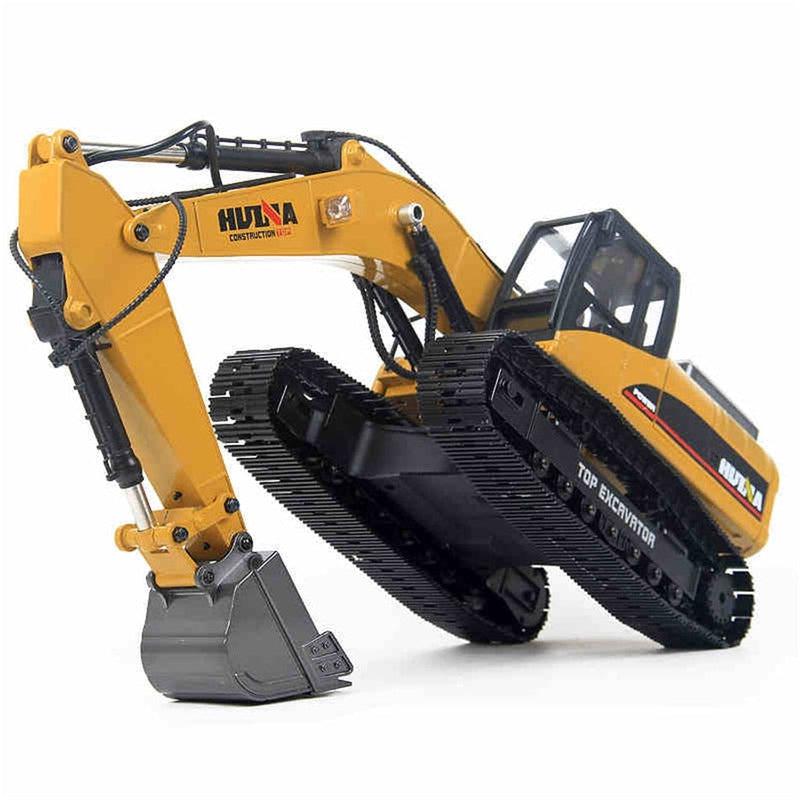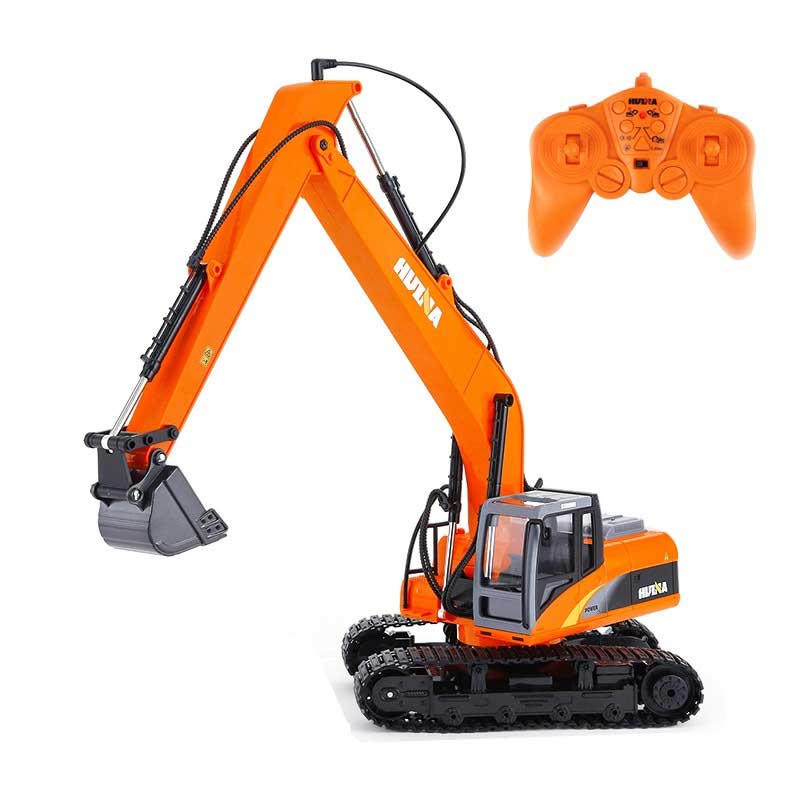Comprehending Exactly How Excavator Works and Its Influence On Efficiency
Excavators play a crucial duty in building and construction and mining procedures, counting on a complicated interplay of mechanical and hydraulic systems. Their ability to perform a variety of jobs rests on both their layout and the innovation integrated within. Recognizing these components can greatly impact functional effectiveness and efficiency. As advancements proceed to improve the industry, one must think about just how these modifications will certainly affect future practices and efficiency.
The Essentials of Excavator Mechanics

The Duty of Hydraulic Systems in Excavators
At the heart of excavator operation lies the hydraulic system, which plays a crucial role in powering the maker's features and activities. This system makes use of pressurized hydraulic fluid to transfer power, enabling various actions such as digging, swinging, and lifting. By harnessing the concepts of hydraulics, excavators can perform jobs with exceptional precision and pressure, boosting total functional efficiency.The hydraulic system contains key elements, including shutoffs, cylinders, and pumps, which interact to manage the flow and direction of the liquid. When the operator engages the controls, the hydraulic fluid is guided to certain cyndrical tubes, equating the driver's commands into physical motion. This system enables for responsive and smooth activities, which are essential in construction and excavation settings. double e volvo rc excavator. The performance of the hydraulic system directly impacts the performance and adaptability of the excavator, making it an indispensable component in contemporary excavation procedures
Trick Parts of an Excavator
Understanding the crucial components of an excavator is essential for realizing exactly how this effective maker operates. An excavator includes several substantial aspects, consisting of the undercarriage, home, boom, container, and arm. The undercarriage supplies stability and flexibility, commonly featuring wheels or tracks to navigate different surfaces. Your house has the engine and hydraulic systems, enabling the driver to control activity and power the maker. The boom extends from your home, allowing upright reach, while the arm links to the pail, promoting digging and lifting operations.Additionally, the taxicab houses the operator, furnished with controls for accurate handling. Each of these parts plays a crucial function in the excavator's total functionality, contributing to its efficiency and effectiveness on construction websites. Recognizing these components aids in optimizing and keeping excavator performance, making certain tasks are finished safely and successfully.
Add-on Versatility and Its Benefits
Accessory convenience is a vital facet of excavators, making it possible for drivers to switch over between various tools customized for particular tasks. This flexibility not just enhances task performance yet additionally adds to cost-effectiveness by minimizing the need for numerous makers. Recognizing the different kinds of attachments readily available can substantially impact the total efficiency and performance of an excavator on work websites.
Kinds of Attachments
While excavators are largely identified for their excavating capabilities, their real flexibility depends on the vast variety of attachments readily available. These accessories enhance the excavator's capability, permitting it to do numerous tasks past excavation. Usual add-ons consist of buckets (for excavating and scooping), hydraulic thumbs (for understanding materials), and augers (for piercing openings) Grapples are made use of for taking care of and relocating particles, while rippers can separate tough surfaces. Various other specialized add-ons, such as plates and plows, allow excavators to adapt to particular job needs. This variety not just increases the maker's utility throughout different industries, consisting of building and construction, demolition, and landscaping, yet additionally enables operators to tailor their equipment to meet specific job demands successfully.
Enhanced Task Performance
Optimizing job performance is a key benefit of using different excavator add-ons. Various attachments enable an excavator to perform numerous tasks without requiring to change tools, conserving useful time and labor. Utilizing a hydraulic hammer can damage concrete while a pail attachment can excavate dirt, making it possible for a smooth operations. This adaptability decreases downtime related to devices modifications and enhances efficiency on-site. In addition, specialized add-ons improve precision in jobs such as grading or landscaping, leading to higher high quality results. The ability to adapt to different job requirements not just streamlines procedures yet additionally minimizes the need for extra machinery, making sure that tasks are completed quickly and successfully. Generally, attachment adaptability substantially adds to enhanced job effectiveness in excavation work.
Cost-Effectiveness and Convenience
Cost-effectiveness is a significant benefit of using versatile excavator accessories. These add-ons enable a solitary excavator to carry out multiple jobs, reducing the need for extra equipment and labor - double e volvo rc excavator. By changing in between pails, hammers, and grapples, drivers can deal with numerous projects, from digging to demolition, thus optimizing equipment utilization. This flexibility not just decreases operational prices yet also reduces downtime connected with changing devices. Additionally, the capacity to tailor excavators with specialized add-ons enhances performance, as they can efficiently manage diverse jobs according to task needs. To wrap up, the combination of cost-effectiveness and adaptability in excavator add-ons adds to improved operational performance and resource allocation in building and excavation projects

Advanced Innovation in Modern Excavators
Modern excavators are increasingly furnished with sophisticated innovation that transforms excavation processes. Automation improves procedures, while boosted gas effectiveness decreases visit this web-site functional prices. In addition, clever control systems improve precision and security, marking a significant advancement in excavation devices.
Automation in Excavation Processes
As excavation modern technology progresses, automation has actually emerged as a crucial element in enhancing performance and precision on task websites. Modern excavators are geared up with innovative automated systems that help with jobs such as grading, digging, and trenching with very little driver intervention. These systems use sensing units, GPS, and artificial intelligence formulas to guarantee precise placing and depth control, considerably reducing the margin for mistake. Furthermore, automation permits operators to concentrate on tactical decision-making as opposed to manual controls, resulting in boosted performance generally. Such innovations not only streamline process yet also improve security by minimizing human error in complicated operations. Consequently, the combination of automation in excavation procedures represents a considerable improvement in construction modern technology, driving the sector towards higher effectiveness and performance.
Boosted Fuel Performance
Improvements in modern technology have likewise resulted in significant renovations in gas effectiveness for contemporary excavators. Modern machines are furnished with advanced engines that enhance power outcome while decreasing gas intake. These engines make use of cutting-edge burning innovations, such as turbocharging and straight fuel shot, to improve efficiency and efficiency. In addition, lightweight products in construction lower total weight, allowing for less energy expenditure during procedure. The intro of variable speed controls enables drivers to readjust engine efficiency according to particular tasks, better lessening gas use. Because of this, these enhancements not just lower operational check these guys out costs however likewise contribute to environmental sustainability by decreasing discharges. On the whole, boosted fuel efficiency in excavators is an important growth that boosts efficiency and financial stability in the building and construction market.
Smart Control Systems
While drivers navigate significantly complicated job websites, smart control systems in excavators have actually arised as important devices for enhancing performance and precision. These advanced innovations utilize sensing units and algorithms to keep an eye on various criteria such as load weight, terrain problems, and operational efficiency. By immediately readjusting hydraulic features, clever systems optimize equipment performance, causing enhanced performance and decreased endure components. Furthermore, drivers profit from intuitive user interfaces that give real-time feedback and diagnostics, enabling educated decision-making. This integration of modern technology not only improves procedures yet also reduces human error, adding to safer work settings. As the construction market proceeds to advance, smart control systems will play a vital function fit the future of excavator performance and effectiveness.
Enhancing Functional Effectiveness With Excavators
Excavators play an important function in improving functional effectiveness throughout numerous construction and excavation projects. Their versatility permits several jobs, consisting of product, excavating, and lifting handling, which simplifies operations and lowers the demand for added equipment. With powerful hydraulic systems, excavators can perform heavy-duty jobs with accuracy, substantially lowering the moment needed to full tasks. The combination of sophisticated innovation, such as GPS and automated controls, even more maximizes their operation, enabling drivers to attain higher accuracy and reduce product waste. Furthermore, modern excavators are created to take in less fuel and reduce emissions, adding to both price savings and environmental sustainability. By making use of excavators properly, building and construction groups can improve efficiency, fulfill task target dates, and boost general site administration. This multifunctionality and effectiveness make excavators essential tools in the modern building and construction landscape.
The Future of Excavators in Building and Mining Industries
As the construction and mining sectors advance, the future of excavators is positioned for substantial improvement driven by technological advancement and changing functional demands. Advances in automation and fabricated intelligence are improving excavator Visit Website capabilities, enabling for boosted precision and performance in procedures. Self-governing excavators are arising, reducing the requirement for human treatment and reducing the danger of accidents.Moreover, the integration of telematics and IoT innovation makes it possible for real-time tracking of device efficiency and predictive maintenance, maximizing uptime. Environment-friendly layouts, including electric and hybrid models, are getting traction, straightening with sustainability goals within the industry.Additionally, making use of innovative materials and lighter designs improves gas effectiveness while keeping efficiency standards. As these trends development, excavators will certainly play an essential role in meeting the enhancing needs for productivity and safety in building and mining, eventually changing functional landscapes.
Often Asked Concerns
Just How Do Climate Condition Affect Excavator Efficiency?

Weather problems considerably affect excavator efficiency, as rain and mud can hinder grip and stability, while extreme temperature levels might impact hydraulic systems. Operators should adapt to these variables to assure excellent capability and security during procedures.
What Safety And Security Steps Should Operators Follow While Making Use Of Excavators?
Precaution for excavator drivers consist of using appropriate individual protective tools, conducting pre-operation inspections, making sure proper interaction with ground personnel, preserving a safe distance from overhanging risks, and sticking to established operational methods to avoid accidents.
Just How Commonly Should Excavators Be Maintained for Optimum Performance?
Excavators should be preserved routinely to assure peak performance, normally every 250 operating hours or as specified by the maker. Routine checks improve integrity, avoid unanticipated break downs, and extend the life expectancy of the devices.
What Is the Ordinary Lifespan of an Excavator?
The typical lifespan of an excavator normally varies from 10,000 to 15,000 hours of operation. Factors influencing durability include maintenance techniques, operating problems, and the quality of the machine itself, affecting general efficiency and effectiveness.

Can Excavators Operate on Irregular Terrain Properly?
Excavators can operate properly on uneven terrain because of their expressed designs and adjustable tracks. These functions permit them to keep security and traction, enabling effective operation in difficult atmospheres generally encountered in construction and landscaping jobs. Each of these elements plays a crucial function in the excavator's total capability, adding to its performance and performance on building and construction websites. Taking full advantage of work effectiveness is a main advantage of making use of various excavator add-ons. While drivers browse significantly intricate work websites, wise control systems in excavators have emerged as crucial devices for improving effectiveness and precision. Excavators play a necessary function in enhancing operational performance across numerous construction and excavation jobs. Developments in automation and man-made knowledge are improving excavator capabilities, enabling for improved precision and performance in procedures.
Comments on “How the remote control excavator Reduces Human Error and Boosts Precision”